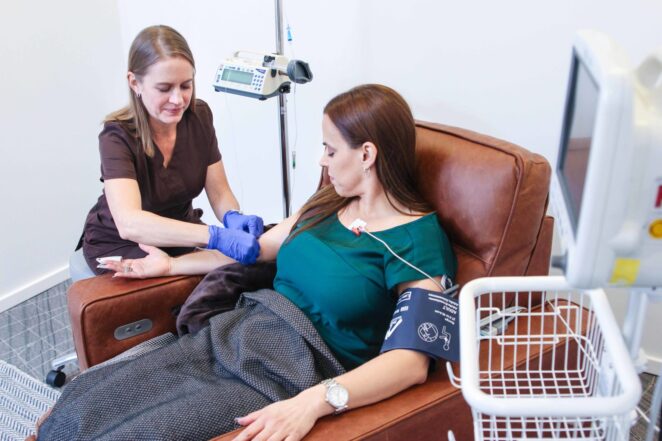As awareness of mental health issues grows, innovative treatment options for conditions like depression have emerged. One such option is ketamine, traditionally known as an anesthetic, which has shown promise as a rapid-acting antidepressant.
However, before considering ketamine treatment, it is crucial to engage in self-reflection and ask important questions.
This article aims to guide you through these questions, providing a framework for making an informed decision about undergoing ketamine treatment for depression.
What is my current understanding of ketamine treatment?
Before embarking on any medical treatment, it’s essential to have a thorough understanding of what it entails. Ketamine works differently than traditional antidepressants, which often take weeks to show effects. Ketamine can provide relief within hours or days. Familiarize yourself with how ketamine works, including its mechanism of action in the brain.
Key points to consider:
- Mechanism of action ─ Ketamine is an NMDA receptor antagonist that influences glutamate levels in the brain, potentially leading to rapid improvements in mood.
- Forms of administration ─ Understand the different forms of ketamine treatment available, such as intravenous (IV) infusions, intranasal spray (Spravato), and oral formulations.
Have I explored other treatment options?

It’s vital to consider whether you have adequately explored other treatment avenues before turning to ketamine. Traditional treatments like psychotherapy, cognitive-behavioral therapy (CBT), and conventional antidepressants should typically be tried first, as they can be effective for many individuals.
Considerations:
- Previous treatments ─ Reflect on your past experiences with therapy and medications. What worked? What didn’t?
- Consultation with professionals ─ Have you discussed all your treatment options with a mental health professional?
What are my specific symptoms and treatment goals?
Understanding your symptoms and establishing clear treatment goals are fundamental steps in the decision-making process. Consider what you hope to achieve through ketamine treatment.
Questions to reflect on:
- Symptom severity ─ Are your symptoms moderate, severe, or treatment-resistant?
- Desired outcomes ─ Are you looking for immediate relief from acute symptoms or long-term management of your condition?
Am I prepared for the potential side effects?
Ketamine treatment can produce side effects, some of which may be significant. While many individuals tolerate ketamine well, it’s essential to be aware of the possible adverse effects and be prepared for them.
Common side effects:
- Dissociation ─ Some people experience feelings of detachment from reality.
- Nausea ─ This is a potential side effect, especially following an infusion.
- Increased blood pressure ─ Monitor your blood pressure, particularly if you have a history of hypertension.
How will I manage the treatment process?

Ketamine treatment typically involves multiple sessions, especially if you are receiving IV infusions. Understanding how this will fit into your lifestyle is crucial.
Key considerations:
- Scheduling ─ How will you schedule your sessions, and can you commit to the recommended treatment plan?
- Transportation ─ Will you have someone to drive you to and from your appointments, particularly after IV treatments?
Am I aware of the treatment setting and provider qualifications?
The environment in which you receive treatment is significant. Ensure that the facility is reputable and the staff is qualified to administer ketamine. It’s important to do your research into the clinics that provide this type of therapy. Only ever turn to reputable and trusted clinics that have a proven track record of successful treatment. Daydream MD is a specialist ketamine therapy clinic with extensive experience and knowledgeable staff.
Questions to ask:
- Certification ─ Is the provider certified and experienced in administering ketamine treatments?
- Safety protocols ─ What safety measures are in place at the treatment facility?
Have I considered the cost and insurance coverage?
Ketamine treatments can be expensive, and insurance coverage varies widely. Understanding the financial implications is crucial.
Financial considerations:
- Cost per session ─ Research the average cost of ketamine treatments in your area.
- Insurance ─ Does your insurance cover any part of the treatment? If so, what percentage will you be responsible for?
Am I in the right mental state for treatment?

Ketamine treatment can provoke intense emotional responses. Reflect on your current mental state and whether you feel stable enough to undergo this treatment.
Self-assessment:
- Current mood ─ Are you feeling overwhelmed, or do you feel ready to tackle this new treatment?
- Support system ─ Do you have a reliable support network to help you through this process?
What are the long-term implications of ketamine treatment?
While ketamine can provide rapid relief, it is essential to think about the long-term implications of treatment, including the potential for dependency and the need for ongoing care.
Long-term considerations:
- Maintenance treatments ─ Will you need ongoing treatments after the initial sessions?
- Impact on mental health ─ How might ketamine affect your overall mental health trajectory in the long run?
How does ketamine treatment fit into my overall mental health plan?
Consider how ketamine fits into your broader mental health management strategy. It should be part of a comprehensive approach that may include therapy, lifestyle changes, and medication.
Holistic approach:
- Integration with therapy ─ Can you incorporate ketamine treatment with ongoing therapy?
- Lifestyle changes ─ Are you prepared to make any necessary lifestyle changes to support your mental health?
What do I expect from my provider?

Establishing expectations for your treatment provider is essential for a successful experience. Open communication can lead to better outcomes.
Questions to discuss:
- Follow-up care ─ What type of follow-up care can you expect after treatment sessions?
- Monitoring progress ─ How will your progress be monitored, and how often will you have check-ins with your provider?
Have I researched success stories and testimonials?
Hearing about others’ experiences can provide valuable insight into what to expect from ketamine treatment. Researching testimonials can help gauge its effectiveness and safety.
Research strategies:
- Online forums ─ Explore mental health forums and social media groups for personal experiences.
- Clinical studies ─ Look into published research on ketamine’s effectiveness for depression to understand its success rates.
To Conclude
Undergoing ketamine treatment for depression is a significant decision that requires careful consideration. By asking yourself these questions, you can better prepare for the journey ahead.
Each person’s experience with depression is unique, and the path to recovery may differ for everyone. Therefore, ensure that you consult with qualified mental health professionals and gather as much information as possible to make the best choice for your situation.



